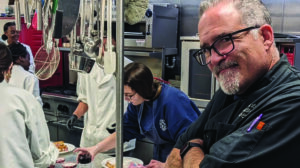Democratic Sen. Ken Gordon sent an e-mail asking citizens to join him in a walk across Colorado in support of Referendums C and D, while Republican Party members are duking it out in the press.The debate between Gov. Owens and County Commissioner Douglas Bruce has been well known; and now state and local Republicans have entered the fray.According to the Colorado Secretary of State Web site, the “Tax Payer’s Bill of Rights,” or TABOR amendment, limits “the annual increase for some state revenue to inflation plus the percentage change in state population.” Any additional tax revenues collected under TABOR are returned to the taxpayer, unless the voters allow the state to spend it.Referendum C’s goal is to suspend TABOR, eliminating some tax refunds, allowing the state to spend the additional revenue over the “next five years on health care, public education, transportation projects and local fire and police pensions,” according to the Web site.”The Colorado Constitution requires voter approval for the state to borrow money if more than one year is needed for repayment.” Referendum D “permits the state to borrow up to $2.072 billion,” and it mandates the money will be used for capital improvement projects for roads, “K-12 and higher education buildings and local fire and police pension obligation.” A final clause “increases the revenue that Referendum C allows the state to keep, up to $100 million each year beginning in 2011.”Former Senator Hank Brown, now president of the University of Colorado, supports both referendums. According to an August 27 article in the Rocky Mountain News, Brown said, “There won’t be a single dollar from the state’s general fund going to higher education within a decade (if C and D fail).””Referendum C amounts to a $3 billion tax increase,” said Colorado District 9’s Sen. Doug Lamborn. “I see the budget up close, and there is a spending problem, not a revenue problem. If there is a little bit of fiscal discipline, we can tackle the problems without passing Referendums C and D.”Barbara Phillips, vice chair of the Pikes Peak Republican Club, said she and Jack Gloriod, chair of PPRC, support the referendums. “We should follow Bill Owens’ lead because he understands the economic needs of the state,” she said.On Sept. 6 Pam Shockley-Zalabak, chancellor of the University of Colorado at Colorado Springs, was the guest speaker at the PPRC monthly meeting. “If C and D pass, we have five years of receiving $2,400 in state funding per student – but without C and D we will have to do some program eliminations,” she said. UCCS Vice Chancellor Brian Burnett added, “Should C and D fail, the university will lose $15.6 million in state funding the first year, and by the end of the decade state funding will drop to zero dollars, making UCCS essentially a private college.”Amy Stephens, Republican candidate for the House District 20 seat currently held by Lynn Hefley, introduced herself to members of the Falcon Republican Club on Sept. 7, and said, “I am definitely opposed to Referendums C and D.”Falcon Republican Club Chairman John Vander Meulen said the club passed a resolution several months ago. It reads, “Whereas, the Colorado economy is rebounding well from the recession, and the Taxpayer’s Bill of Rights was passed in 1992 by a statewide majority, be it resolved that the Republican Club of Falcon opposes the passage of Referendums C and D in the November 2005 election.”The debate goes to the voters on Nov. 1. The last day for voter registration is Oct 3. For more information, visit www.sos.state.co.us.






